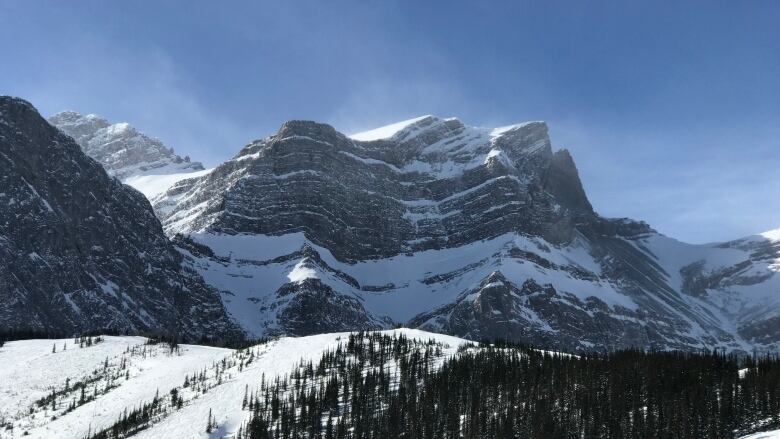Dry winter drops risk of flooding posed by snowpack melt to low levels
But less moisture increases threat of summer wildfires in the West

There's less snow than usual to melt in the mountains this spring. That's the message from hydrologist John Pomeroy, a Canmore-basedwater expert.
"It's lower than the normal over most of the mountains," Pomeroy said, in a Monday interview on the Calgary Eyeopener.
"That's what we're going to be seeing at this point: lower snowmelt contribution to streams."
Pomeroy, the Canada Research Chair in Water Resources and Climate Change, and the director of the Coldwater Laboratory at the University of Saskatchewan, said the explanation for the diminished flows isn't complicated.
"The amount of precipitation since those snow storms [Oct.1-3]has been quite a bit lower about 40 per cent lower than the normal for the mountains," Pomeroy said.

Low accumulation
Pomeroy said it was understandable if people felt as if there was more snow, because an event like the Oct.1-3 Snowmageddon, in which over 30 cm of snow fell in a single day,tends to distort thereality of what was actually a relatively dry winter.
"Alot of the big snowfalls are down as much as one third sometimes a little bit less," he said."There'sbeen fairly low accumulation to those pools and to those high mountain sites since the beginning of February."
And while the meagresnowpackdoes not appear to pose a flood threat to the city, Pomeroy said that doesn't necessarily mean Calgary is out of the weeds just yet.
"Floods have always been associated with rain in Calgary. And so rain on top of snow can make it worse but rain by itself can also causeflooding," Pomeroy said.
Fire risk
More likely than flooding,however, is the possibility of another long, hot, dry and quite possibly smoky summer, Pomeroy said.
"We have to start to think that way now, unfortunately," Pomeroy said."Once you lose the snowpack, that means it's fire season and the soil moisture from last summer and fall going in [to winter] remained low."
Pomeroy said the snowpackto the west and across B.C. isn't very high, either, and the region experienced a very early melt, similar to what Alberta has experienced "so there are areas already at risk of starting fires," he said.
"We'll see over the next few weeks how it progresses.
"But you know, last year had a near record snowpack," he noted."And ina lot of British Columbia,it melted early, and within a few weeks you'reinto fire season, so the the main trigger of the snowpack is when it melts then fires can begin."
Pomeroywouldn't weigh in with any political assessments, when the question of which provincial political party possessed any sort of platform or policies designed to address the situation.
"I haven't seen direct things on water management. I haven't looked in that amount of detail there, but the extreme events that we're seeing are associated with climate change," he said.
"If we want these to end and I think we all do then we have to fix what's going on in the atmosphere, and that means reducing the amount of carbon dioxide and other greenhouse gas emissions to the atmosphere."
With files from the Calgary Eyeopener.












_(720p).jpg)


 OFFICIAL HD MUSIC VIDEO.jpg)
.jpg)



























































































